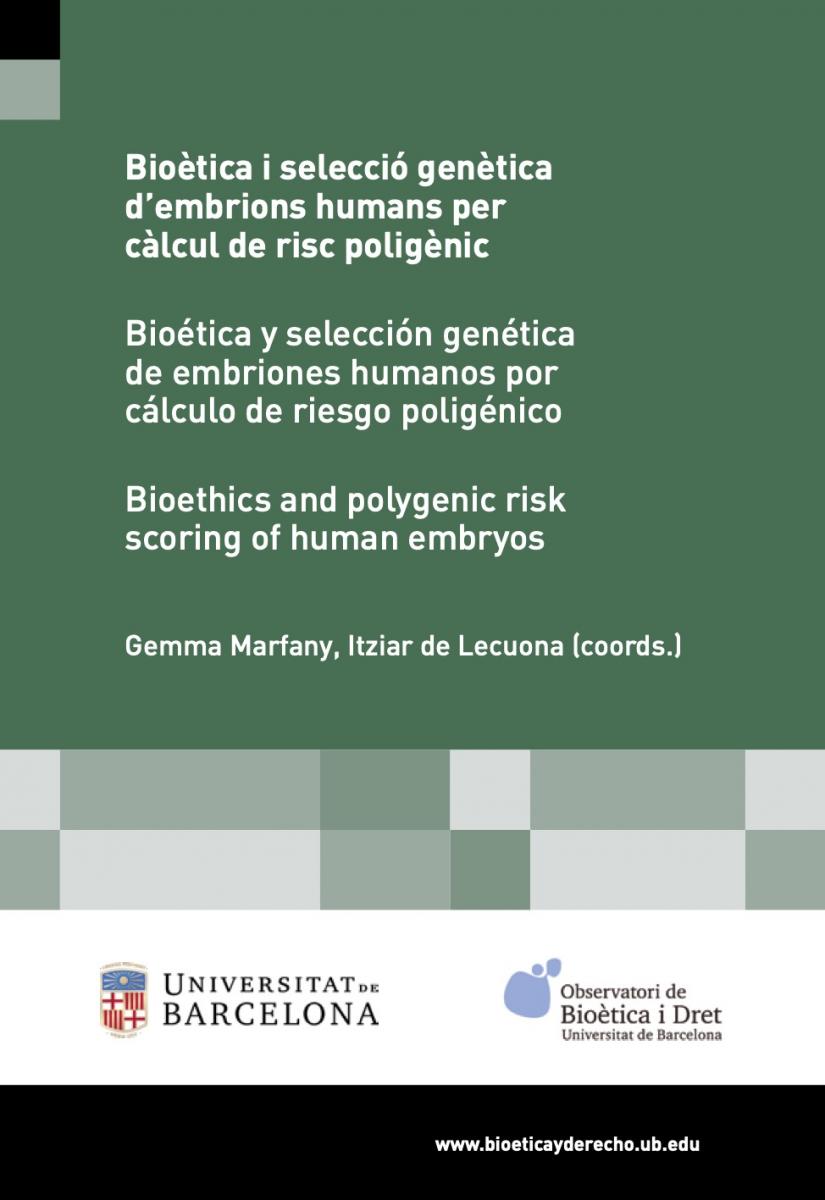The Bioethics and Law Obs.
Master in Bioethics and Law
UNESCO Chair in Bioethics
Contact
- Bioethics and Law Observatory
- UNESCO Chair in Bioethics
- University of Barcelona
- Faculty of Law
- Ave. Diagonal, 684
- 08034 Barcelona
- (+34) 93 403 45 46
- obd.ub@ub.edu
- Master in Bioethics and Law
- (+34) 93 403 45 46
- master.bd@ub.edu
The Bioethics and Law Observatory publishes the document “Bioethics and polygenic risk scoring of human embryos”, coordinated by Gemma Marfany and Itziar de Lecuona
The Opinion Group of the Bioethics and Law Observatory at the University of Barcelona has published the document “Bioethics and polygenic risk scoring of human embryos”.
Since 2000, the Group has published several reports discussing the ethical, legal and social implications of assisted human reproduction. These reports have had a remarkable regulatory impact, as seen in the Spanish Assisted Reproduction Act (14/2006) and Biomedical Research Act (14/2007), which include several of the Group’s recommendations.
The objective of all these documents, available in open access, is to promote the dialogue between academia and society with the goal of empowering individuals to make free and informed decisions.
For this reason, the Group has developed this new report, with the purpose of revisiting this topic in light of current advances in genetic diagnosis of complex polygenic diseases.
Modern genome sequencing techniques allow scientists to obtain more information than ever on the genetic makeup of cells and organisms, including people, something that can be (and already is) exploited in a context of commodification of the human body and its parts.
All of that raises many bioethical questions, which are discussed in the document.
Abstract:
Currently, some assisted reproduction and genetic clinics offer parents the possibility to select their embryos according to a polygenic risk score.
The selection is based on the probability that their offspring may develop certain diseases or undesirable characteristics in adulthood (examples include type 2 diabetes or cardiovascular problems, but also short stature or level of intelligence).
The calculation of a polygenic risk score is not comparable to the genetic diagnosis of Mendelian (i.e. monogenic) disorders, which does have a high level of certainty when the causative gene or genes are known.
Conversely, the etiology of these diseases is polygenic and multifactorial, involving genetic variants in multiple genes. Not all the genes influencing these characteristics, or their respective proportions, are known. In addition, the contribution of the environment —often pivotal— is frequently underappreciated.
Currently, numerous in vitro fertilization (IVF) clinics in the United States provide polygenic risk score tests to predict cognitive abilities, often in addition to pre-implantation genetic testing of Mendelian disorders, within the same package. Diagnostic tests with clinical value are thus conflated, deceptively, with tests for the genetic selection of embryos possessing certain “guaranteed” characteristics which are unrelated to any actual disease.
This situation highlights relevant scientific gaps and raises bioethical questions, as it manifestly falls within the domain of “genetic improvement”.
The document analyzes the state of the art and includes a series of conclusions and recommendations to address the problem.
Authors and collaborators:
The report gathers the contributions and knowledge of various members and collaborators of the Bioethics and Law Observatory, and of lecturers of the Master in Bioethics and Law at the University of Barcelona.
It has been written and coordinated by Dr. Gemma Marfany, Full Professor of Genetics at the Faculty of Biology at the University of Barcelona; and Dr. Itziar de Lecuona, Associate Professor at the Department of Medicine and director of the Bioethics and Law Observatory at the University of Barcelona.
Significant contributions were made by: Dr. Manuel Jesús López Baroni, Associate Professor of Philosophy of Law at the Pablo de Olavide University; Dr. Josep Santaló, Full Professor of Cellular Biology at the Autonomous University of Barcelona and specialist in reproduction; Dr. María Casado, Full Professor of Philosophy of Law, Moral and Political Philosophy and UNESCO Chair in Bioethics at the University of Barcelona; and Dr. Anna Veiga, biologist, expert in human reproduction and director of the Stem Cell Bank of Barcelona at the Bellvitge Biomedical Research Institute (IDIBELL).
You can read the previous reports published by the Bioethics and Law Observatory about the ethical, legal and social implications of assisted human reproduction in the following links:
- Document on bioethics and gene editing in humans (2016)
- Document on genetic tests of filiation (2006)
- Declaration on gender selection (2003)
- Document on oocyte criopreservation for human reproduction (2002)
- Declaration on embryonic stem cells (2001)
- Document on oocyte donation (2001)
- Declaration on embryo research (2000)
This publication is part of the results of the R&D&I project “Cuestiones bioéticas no resueltas en la evaluación de la investigación e innovación en salud basada en inteligencia artificial, tecnologías genéticas y datos personales (BIOEVAINNOLAW)” (PID2022-138615OB-I00), funded by MICIU/AEI/10.13039/501100011033 and FEDER/UE. Principal researcher: Itziar de Lecuona.







